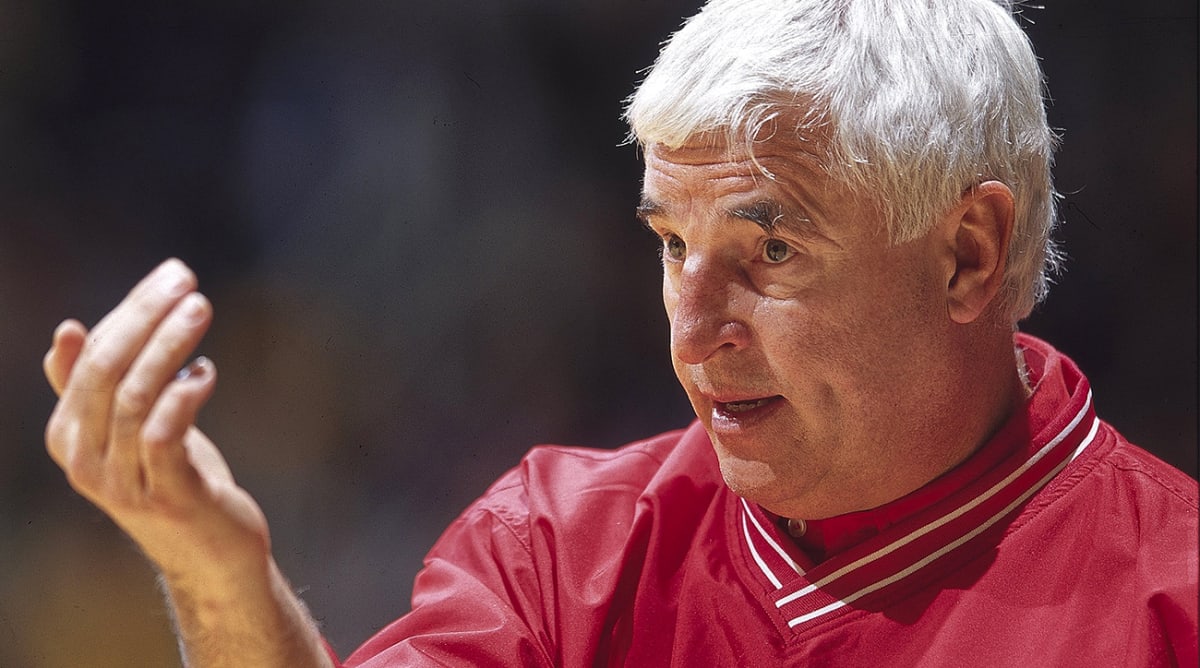One of the central questions about Bob Knight’s life was whether he had to act like Knight to win like Knight. He didn’t, but it was easier for him to believe he did. It was easier to think the temper tantrums were justified, that every bit of intimidation and belittling was a means to an end. In that sense, Knight sold himself short, because he might have been the greatest basketball coach who ever lived.
It’s a hard case to make today. The NBA has been the sport’s dominant product for a long time, not just in interest and skill level but in artistry. Think of a cohesive modern-day basketball team, and the Warriors come to mind. The best college teams are microwaved before the players bolt for the pros. The coaches who thrive in that world understand that part of the job is understanding its limits. The goal is to build the best team in a short amount of time.

Sports Illustrated
Statistical arguments do not favor Knight. John Wooden won 10 titles in 12 years. Knight’s protégé, Mike Krzyzewski, won 303 more games and lost six fewer. Coach K won five NCAA titles to Knight’s three and made 13 Final Fours to Knight’s five. Krzyzewski thrived for much longer, in distinctly different eras and under a variety of rules, and once he started winning big, he never really stopped.
To young basketball fans, NBA coaches are the ones who impose an ethos on a team: Phil Jackson’s Zen mastery gave way to Pat Riley and Erik Spoelstra’s Heat culture, Gregg Popovich’s straight talk and Steve Kerr’s emotional intelligence.
But give them all the same talent, the same amount of practice time and the same number of games, and put them all in a tournament at the end, and I’ll take my chances with Bob Knight’s team.
Maybe you had to see it to understand. Year after year, the Indiana men’s basketball team was an orchestra. The constant movement, the passing, the discipline, the hustle, the man-to-man defense, the mental toughness … the Hoosiers were not just the best-coached team in America; they appeared to be the definition of what great coaching looks like.
The two best players Knight ever had never played for him at Indiana. Larry Bird left during his freshman year and ended up at Indiana State. Michael Jordan played for him on the 1984 Olympic team.
Knight had one true all-time great: Isiah Thomas, who led the Hoosiers to the 1981 championship. Besides Thomas, he coached only one other player, George McGinnis, who averaged 15 points per game in his NBA career. The ’80s featured more experienced talent than any other era in college basketball history. Knight won the ’87 title with one player, Dean Garrett, who would become an NBA starter, and Garrett spent seven years in Europe before playing in the NBA.
In 1993, Michigan had Chris Webber, Juwan Howard and Jalen Rose as sophomores. Indiana started Calbert Cheaney, Greg Graham, Alan Henderson, Matt Nover and Damon Bailey. Indiana beat Michigan twice, won the Big Ten outright and very well might have won the national title if Henderson had not injured his knee.
Knight’s teams had talent, of course. But compared to, for example, what Dean Smith had at North Carolina? It wasn’t close. Smith’s 1982 North Carolina team, with Jordan, James Worthy and Sam Perkins, was probably more talented than Knight’s all-time starting five.
Very few people understand what it’s like to know—with the support of evidence—that they do something better than anybody else in the world. Knight was one of those people. I understand why he bristled when people acted like his temper was his most important trait or why his controversies defined him.
Of course Knight knew he was wrong sometimes. He was also capable of expressing regret. But he could not stand having people who knew less about basketball tell him who he was. He was so stubborn about it that over time, it really did become his most obvious trait.
Knight’s relationship with Krzyzewski started to get rocky when the media started portraying Krzyzewski as Knight without the flaws. Knight would bark at reporters who asked a question he found uninformed—giving the question far more life than it would have if he just answered it, and giving the stories about his temper another run in the news cycle. He would also go out of his way to remind the world of his singular genius. He once explained a comeback over Dale Brown’s LSU team by saying: “I looked down toward the other bench, and I saw Dale Brown standing there. I knew then that we had a chance.”
The last act of Knight’s Indiana tenure was innocuous compared to so many others. A student yelled, “Hey, what’s up, Knight?” at him. Knight put his hands on the student and told him to address him with a more respectful term, like “Coach Knight.” Indiana president Myles Brand decided Knight had broken his new zero-tolerance policy and fired him.
Knight saw it as proof that some people were determined to define him by his temper, no matter what he did. That may be why Knight could never forgive Indiana: He had fought for years over the meaning of his life’s work, and, in the end, Indiana took the other side. In his mind, the teams he put on the floor mattered far more than a chair he threw across it. In his mind, he was always, always, always Coach Knight.







